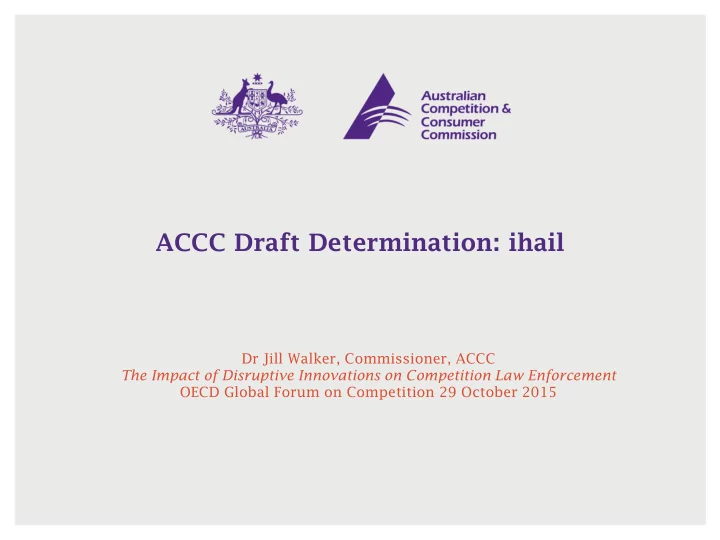

ACCC Draft Determination: ihail Dr Jill Walker, Commissioner, ACCC The Impact of Disruptive Innovations on Competition Law Enforcement OECD Global Forum on Competition 29 October 2015
Background • ‘Authorisation’ provides exemption from competition law where a net public benefit test is met (ACCC or the Australian Competition Tribunal on review) • Taxi markets in Australia are highly concentrated • Cabcharge has dominated payment processing (and related taxi specific payment instrument) - history of enforcement action by the ACCC & recent new entry ( Cabcharge also have ownership interests in taxi companies) • Several independent 3rd party booking apps, e.g. goCatch & ingogo (compete for drivers & customers) & taxi network specific apps already exist • Legal status of Uber still unclear in most states, but the ACT has proposed to legalise and regulate • ihail applied for authorisation of a JV involving competing taxi companies and Cabcharge to operate a smartphone booking app (the ihail app) – aggregate competing taxi networks on a single booking app (with fares allocated to the first available driver) – payments processing exclusively “in app” by Cabcharge (no in cab payment) – Includes a ‘tipping function’ = payment for priority dispatch • ACCC Draft Determination proposes to deny authorisation (12 Oct 2015) • Final decision expected November/December 2015 2 November 2015 Conference 2
Draft Determination • Public Benefits – consumers would have access to a larger pool of taxis on a single app – single app could be used in multiple cities (domestic and international) – but independent apps can also be used in multiple locations and each taxi network app accounts for a large pool of taxis • Public Detriments – ihail may achieve a dominant position through agreement between competitors vs competition with existing apps for consumers and taxis: from the launch of the app, ihail’s ownership structure would give it a larger fleet of taxis across Australia than any other app (over half of all taxis in Australia, a larger share in metropolitan areas and additional networks & drivers may join) – reduced incentive for taxi companies to compete on price or service for customers booking through the app: allocation of fares on a “first available” basis means taxi companies can expect to receive a share of bookings approximately equal to their share of taxis on the road – Cabcharge already dominates in taxi payment processing and the proposed exclusive arrangements would foreclose fledgling competitors from a potentially significant portion of the payment processing market – Priority dispatch payments potentially in breach of state government price regulations and reduced access to taxis for financially disadvantaged persons 2 November 2015 Conference 3
Incumbent attempt to remain dominant or pro-competitive? • The ACCC is ripe for disruption “This is one of the most starkly absurd decisions the ACCC has made, probably in its entire history. In the midst of a furious contest between taxis and Uber, the ACCC has decided to cripple the taxi companies’ ability to innovate in response to competition.” John Roskam, Executive Director Institute of Public Affairs • ihail argues their app is pro consumer and pro competition in response to Uber • Is the ACCC right to be concerned that ihail: – could be a tipping point for network effects and replace competition with a dominant app; and – potentially foreclose emerging competition in taxi payment processing? 2 November 2015 Conference 4
Recommend
More recommend